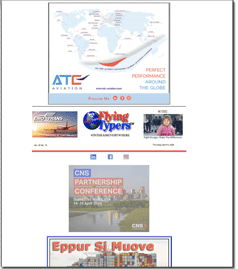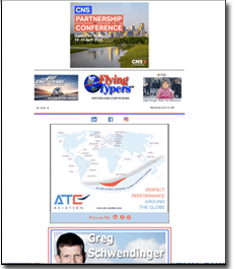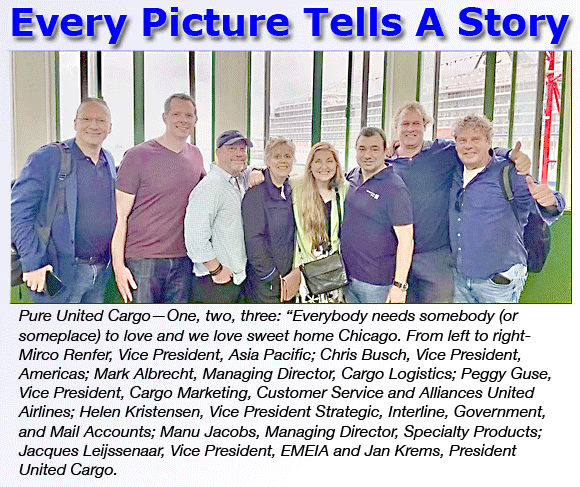 |
Sometimes when you truly love somebody or
someplace the feeling can drive a further celebration. I have loved Chicago
where I first went to school and was elected President of the Third Grade.
I am still a member of the fabulous Chicago Art Museum where I got lost
in the beauty of the place and the art especially by Edward Hopper’s
Nighthawks when I was only 12 years old. So Chicago as home base for United
Airlines has always been a fave, not only because UA is a great story,
but also for the emotion of lifelong love affair with that city that endures
and continues to burn brightly.
Not only is Jan Krem, President of United
Cargo, preeminent at what we consider the most exciting airline cargo
program of this decade, but as 2024 stays the carrier continues to set
the pace with a new, captivating and exciting offering. There is something
irresistible in Team United that has delivered excellence, concern and
performance to our industry. Impossible to avoid thinking of the strength
of the teams when they play in the arena.
As baseball begins in America, we are thinking
about team play and what it can mean both in sports and business. Chicago
is home to lots of sports teams, not only the Chicago Cubs the boys of
summer play games of baseball in the friendly confines of Wrigley Field
that opened 110 years ago April 14, 1914. The United Cargo Team of 2024
described here includes eight people ensconced and comfortably situated
inside the beautiful iconic Willis Tower. That United Cargo is in some
part a product of its surroundings is no reach we discover after talking
to the team in a round robin fashion over a number of years. There is
just so much that shines from that picture!
On May 28th 1971 Rod
Stewart published his iconic album
"Every Picture Tells a Story”. At the time it appeared,
it had a distinctive, soothing sound in a landscape that was mostly dominated
by a much harder approach to rock music. When I saw the picture here ,
Stewart’s title instantly came to mind. Look at the picture from
left to right all our friends from United are there: Mirco, Chris, Mark,
Peggy, Helen, Manu, Jacques, Jan. They show their relaxed, joyful and
forward looking faces at their best. It is precisely as set above: a distinctive,
soothing glimpse on the airline’s team, which is otherwise dealing
with the difficulties of the job on a daily basis, which is a much harder
version of the same. So let us get to know these wonderful people more
personally. Here is the perfect example of the power of people and place
in a rare behind the scenes look at Team United in 2024 as CNS Partnership
meets in Texas, and the band plays on.
GDA
 |
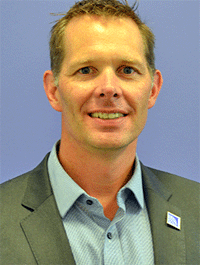 Chris
Busch is Vice President, Cargo Americas for United Airlines. He is responsible
for all aspects of United Cargo's North America, South America and Latin
America sales, operations, and revenue management. Chris has been with
United Airlines for 16 years and has held several positions including
Director of Cargo Revenue Management for United, with responsibilities
for the Global Revenue Management and Sales Strategy groups. He was happy
to take some of our questions. Chris
Busch is Vice President, Cargo Americas for United Airlines. He is responsible
for all aspects of United Cargo's North America, South America and Latin
America sales, operations, and revenue management. Chris has been with
United Airlines for 16 years and has held several positions including
Director of Cargo Revenue Management for United, with responsibilities
for the Global Revenue Management and Sales Strategy groups. He was happy
to take some of our questions.
FT: The
arrangements for the delivery of COVID-19 vaccines represent one of the
largest logistics operations ever, but can we say that the operation managed
to stand on its feet from an economic point of view, or was just the benefit
for United from the image point of view that justified the investment?
CB: The
COVID-19 pandemic triggered a seismic disruption in the aviation sector,
affecting United Airlines and its counterparts worldwide. Almost overnight,
the landscape of international travel underwent a drastic transformation,
with our daily international widebody departures plummeting from over
300 to a mere handful, possibly six or fewer flights. This abrupt downturn
compelled us to swiftly pivot our focus towards sustaining our cargo operations,
safeguarding global supply chains, and ensuring the continued functionality
of our airline.
In response to the unparalleled reduction
in passenger flights, we initiated Freight Only Flights to keep our aircraft,
pilots, and cargo infrastructure operational. Although these flights might
not have been financially viable under normal circumstances, they served
as a pragmatic solution to prevent our assets from remaining idle. While
we cannot divulge precise financial figures, it's essential to acknowledge
that these flights played a pivotal role in maintaining operational continuity
and facilitating the uninterrupted flow of essential goods during an exceptionally
challenging period.
The transportation of COVID-19 vaccines
presented an exceptional opportunity for United Airlines to embody our
corporate mission of "Good Leads The Way." Throughout the pandemic,
our commitment to supporting public health initiatives and serving communities
remained unwavering. Transporting a substantial
volume of vaccines, including the distinction of being the first passenger
airline to transport vaccines to the USA, stands as a remarkable achievement
and a testament to our dedication to societal welfare.
While the economic viability of certain
operations during the pandemic may have posed challenges, our commitment
to upholding our corporate mission and contributing to global initiatives
remained resolute. The successful delivery of COVID-19 vaccines underscores
our adaptability in navigating unprecedented circumstances, our leadership
in times of crisis, and our responsibility to the communities we serve.
 Jacques
Leijssenaar is Vice President, United Cargo EMEIA for United Airlines.
He is responsible for all aspects of United Cargo's activity in the EMEIA
region and plans and directs the work of United Cargo's team of sales,
operations, and revenue management professionals in the region. Jacques
Leijssenaar is Vice President, United Cargo EMEIA for United Airlines.
He is responsible for all aspects of United Cargo's activity in the EMEIA
region and plans and directs the work of United Cargo's team of sales,
operations, and revenue management professionals in the region.
FT: Your
assignment covers the largest area in the world in terms of population
and is one of the hottest areas of the world, both politically and diplomatically.
This is also an area where competition is fierce. Probably it is impossible
to say this is a comfortable position, but you surely have reasons for
being satisfied. Can you name three, please?
JL: Despite
operating in a challenging and fiercely competitive environment, these
factors collectively contribute to our success and position us for continued
growth and relevance in the region:
•
Pipelining Concept: Our innovative pipelining
concept, which involves channeling units between and via our hubs in Europe
and/or the US, enables us to provide seamless and endless routing opportunities
for our customers. This approach allows us to offer a level of flexibility
and accessibility that is unparalleled in the industry. Additionally,
the establishment of a dedicated commercial desk for big shipments and
projects has allowed us to enter markets traditionally dominated by full
freighters, thereby expanding our capacity offerings and enhancing our
competitive edge.
•
Operational Performance: Our operational performance
serves as the cornerstone of our reliability concept. By focusing extensively
on BUPs (build-up pallets) or full units, we have been able to maintain
a consistently high level of operational efficiency and reliability. This
reliability not only instills confidence in our customers but also positions
us as a preferred choice in the fiercely competitive market.
•
Increased Market Position in Specialty Products:
We have made significant strides in bolstering our market position in
the specialty product segment, particularly in the Temperature Controlled
segment, as well as in the Fashion and Automotive verticals. Through targeted
strategies and investments, we have successfully captured a larger share
of these lucrative markets, further solidifying our presence and relevance
in the region. This diversification and expansion into specialized segments
have not only contributed to revenue growth but also enhanced our reputation
as a versatile and reliable logistics partner.
 Mirco
Renfer is Vice President, United Cargo Asia Pacific. He is responsible
for all aspects of United Cargo's activity in the Asia Pacific region
and plans and directs the work of United Cargo's team of sales, operations,
and revenue management professionals in the region. Renfer joined United
Airlines in 2006. Prior to his assuming his current role, he led United
Cargo Sales for the Europe, Middle East, India and Africa region. Before
joining United, Renfer worked for United Cargo's General Sales Agent in
Switzerland for nine years in operations and sales positions of increasing
responsibility. Mirco
Renfer is Vice President, United Cargo Asia Pacific. He is responsible
for all aspects of United Cargo's activity in the Asia Pacific region
and plans and directs the work of United Cargo's team of sales, operations,
and revenue management professionals in the region. Renfer joined United
Airlines in 2006. Prior to his assuming his current role, he led United
Cargo Sales for the Europe, Middle East, India and Africa region. Before
joining United, Renfer worked for United Cargo's General Sales Agent in
Switzerland for nine years in operations and sales positions of increasing
responsibility.
FT: Your
assignment covers the second largest area of the world in terms of population
and it is well on its way to become the biggest in terms of economy, if
it is not already. Competition is constant, but volumes have been generous
in recent years. You are coming from an experience in Switzerland and
then EMEIA. What makes Asia so interesting for you and United?
MR: For
me personally, transitioning from markets where capacity typically exceeds
demand to those where the reverse holds true was a significant change.
However, it was also an incredibly interesting shift. In Asia, managing
the capacity to best serve our customers' needs while maximizing revenue
opportunities for both them and United has been a stimulating challenge.
Every inch and pound of capacity becomes crucial, and optimizing its utilization
becomes a top priority.
Another intriguing aspect of the transition
was the shift in geography. In EMEIA, we could rely on trucking for the
transportation of goods around our capacity. However, in Asia, trucking
is not a feasible option. Therefore, we had to orchestrate a robust interline
solution within the region to ensure that cargo reached our capacity's
departure points efficiently and effectively.
For United Cargo, the Asia-Pacific (APAC)
region remains profoundly captivating. It stands as a powerhouse of production
and is rapidly becoming the world's economic epicenter. The exponential
growth of e-commerce is just one facet of APAC's expanding landscape.
Additionally, the pharmaceutical sector is witnessing the emergence of
new products, while the automotive industry is witnessing the rapid rise
of new brands. United's advantage in this dynamic environment lies in
the necessity for speed in transporting these products. Our commitment
to daily Transpac flights, with 95% of them operating on a daily basis,
underscores our dedication to meeting market demands promptly.
Moreover, our position as the largest commercial
airline on the Transpac sector, coupled with the extensive spread of our
departures across North, Central, and Southeast Asia, as well as the Oceanic
region, further exemplifies our keen interest and investment in the APAC
market. This strategic positioning allows us to cater to the diverse needs
of customers across the region efficiently and underscores our commitment
to facilitating trade and connectivity in this dynamic and rapidly evolving
market.
The dynamic nature of the Asia-Pacific region,
coupled with its rapid economic growth and evolving market landscape,
presents immense opportunities for United Cargo. Our ability to adapt,
innovate, and strategically position ourselves enables us to thrive in
this competitive environment and continue delivering value to our customers
and stakeholders alike.
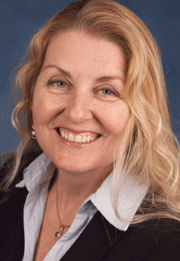 Helen
Kristensen is the Vice President of United Cargo's Strategic, Interline,
Government, and Mail Accounts. She is responsible for leading the team
of United Cargo professionals who manage the organization's largest global
accounts including freight forwarders, interline partners, the U.S. Government,
and global postal partnerships. Kristensen joined United Airlines in 1995
and held management positions in Passenger Sales, Sales Planning, Airport
Operations, Customer Satisfaction and United's Mileage Plus organization.
She also served as a United Cargo Sales Strategic Partner Manager for
seven years prior to assuming her current role. Helen
Kristensen is the Vice President of United Cargo's Strategic, Interline,
Government, and Mail Accounts. She is responsible for leading the team
of United Cargo professionals who manage the organization's largest global
accounts including freight forwarders, interline partners, the U.S. Government,
and global postal partnerships. Kristensen joined United Airlines in 1995
and held management positions in Passenger Sales, Sales Planning, Airport
Operations, Customer Satisfaction and United's Mileage Plus organization.
She also served as a United Cargo Sales Strategic Partner Manager for
seven years prior to assuming her current role.
FT: You
probably hold one of the most difficult positions with regard to the required
level of compliance. Your career also indicates a strong bond with the
customer. At times we see that customers’ needs and a strong compliance
culture seem to stand at either ends of the company’s interests.
How do you manage to conciliate these two strong and unavoidable facets
so successfully in your job?
HK: You are
indeed correct that I feel a very strong bond with our customers and my
team always strives to present our customers with solutions that meet
their needs. I am fortunate to work for an airline that, in my opinion,
has the best network of any carrier in the world, along with the best
fleet. My team utilizes both widebody and narrowbody aircraft to provide
unique and innovative solutions for our customers. We have also worked
hard to expand our partner relationships to complement and “fill
in the gaps” when it comes to our global coverage. All of these
factors combined make it easy to always be able to find solutions for
our entire portfolio of customers.
My team is also well-versed in the complex
regulations that govern our business and our customer relationships. We
receive terrific support from our compliance teams and they understand
the importance of finding solutions that work for our customers. They
are partners and part of the process when we are trying to solve for something
we have not encountered before or when faced with changes to existing
processes. All of us are persistent and have cargo hearts so even if we
are challenged by a new opportunity, we will keep working at it to find
a way to support our customers and grow the business together.
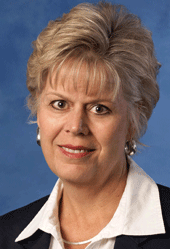 Peggy
Guse is Vice President, Cargo Marketing, Customer Service and Alliances
for United Airlines. She has oversight for a broad range of support functions
within United Cargo including Marketing & eCommerce, Strategy &
Analytics, Technology Products & Development, Customer Service and
Alliance partnerships. Prior to joining the United Cargo organization,
Guse held leadership positions in United's Contact Center Strategy and
Sales Strategy groups. She is a veteran of the travel industry having
held senior management positions in the car rental, hotel and travel agency
segments prior to joining United Airlines. Peggy
Guse is Vice President, Cargo Marketing, Customer Service and Alliances
for United Airlines. She has oversight for a broad range of support functions
within United Cargo including Marketing & eCommerce, Strategy &
Analytics, Technology Products & Development, Customer Service and
Alliance partnerships. Prior to joining the United Cargo organization,
Guse held leadership positions in United's Contact Center Strategy and
Sales Strategy groups. She is a veteran of the travel industry having
held senior management positions in the car rental, hotel and travel agency
segments prior to joining United Airlines.
FT: From a certain point of view, you hold
one of the most important positions in the company. Your career seems
to indicate a strong calling to travel and tourism, but you privileged
cargo in United. We have two questions for you: “how important is
cultural diversity in your strategy?” is our first question, and
the second: “it seems to be difficult for airlines to think of cargo
at the same level as passengers in terms of strategy and importance, what
about United’s view on this?”
PG: How
important is cultural diversity in our strategy . . . in
one word . . . “very”. As a global organization,
we value cultural diversity in our customers, our product offerings and
our team. Our customers and their needs come in all shapes and sizes.
We do our best to build a customer-focused strategy to fulfill a wide
range of ever-changing needs. The same is true for our team—a diverse
cross-section of experiences, backgrounds and skills is a “big piece
of the puzzle” when assembling a world-class team. So, cultural
awareness/diversity are indeed very important in our quest to be the best!
As for your second, question, at United,
as with most companies, every part of the organization has a role to play.
Our role in the cargo arm of the organization is to optimize the belly
of the aircraft by moving valuable freight for our customers. Whether
it’s shipping perishables, automotive parts or vaccines –
we provide a great service for our customers while also contributing to
the bottom line of the company. We whole-heartedly embrace the role we
play in contributing to the success of the broader organization.
 Manu
Jacobs is Managing Director, Specialty Products at United Cargo. He oversees
United Cargo’s suite of Specialty Products including Express, TempControl,
QuickPak, PetSafe, TrustUA, and UASecure. He is also one of the founding
members of United’s COVID-19 Vaccine Readiness Task Force. Jacobs
joined United Cargo in July 2016. Prior to his United role, Jacobs spent
15 years at Air France/KLM Cargo as Director of Global Business Development
for the pharmaceutical division. Manu
Jacobs is Managing Director, Specialty Products at United Cargo. He oversees
United Cargo’s suite of Specialty Products including Express, TempControl,
QuickPak, PetSafe, TrustUA, and UASecure. He is also one of the founding
members of United’s COVID-19 Vaccine Readiness Task Force. Jacobs
joined United Cargo in July 2016. Prior to his United role, Jacobs spent
15 years at Air France/KLM Cargo as Director of Global Business Development
for the pharmaceutical division.
FT: This
is another area where the required level of compliance is strong, in this
case the pressure probably comes both from regulatory compliance as well
as customers’ requirements. Your career indicates a strong experience
with pharmaceuticals. You must have lived the COVID-19 vaccines’
mission as a God-given blessing, or did it sound almost as a sentence
for doing time? It was surely a glorious moment of United, but at what
cost?
MJ: The
required level of regulatory compliance is indeed a critical aspect, and
at United, we view it as a positive force driving excellence and reliability
in our operations. We understand the significance of adhering to stringent
regulations, not only from a regulatory standpoint but also in meeting
the expectations of our customers. This heightened level of compliance
serves as a constant reminder that the patients receiving these pharmaceutical
products could very well be our own loved ones, which underscores the
gravity of our responsibility.
The establishment of United's unique Covid-19
readiness taskforce presented significant challenges initially, but it
ultimately proved to be immensely rewarding. While the mission to transport
COVID-19 vaccines was not bestowed upon us as a God-given blessing, it
was undoubtedly a critical and life-saving endeavor. However, navigating
through uncharted territory and overcoming numerous obstacles along the
way presented its own set of challenges.
Thanks to our enterprise-wide approach and
exceptional collaboration with governmental agencies, regulatory bodies,
and vaccine developers, we were able to implement industry-changing operational
protocols. It was a race against time, but our efforts paid off, as evidenced
by the adoption of our innovative processes by many airlines. Our initiative
to safely increase dry ice amounts on board aircraft has particularly
been game-changing, enabling airlines worldwide to transport vaccines
more effectively.
Countless hours of dedication and energy
were poured into this endeavor by everyone at United and numerous stakeholders
beyond. However, despite the challenges and sacrifices, we would willingly
and wholeheartedly embark on this journey again. The profound impact of
our contributions to global health and the understanding gained by our
children regarding the significance of our work serve as testament to
the importance and value of our efforts.
While the mission to transport COVID-19
vaccines was undoubtedly challenging and demanding, it was also profoundly
fulfilling and impactful. Our commitment to excellence, collaboration,
and innovation allowed us to navigate through obstacles and contribute
to the global fight against the pandemic, leaving a lasting legacy in
the process.
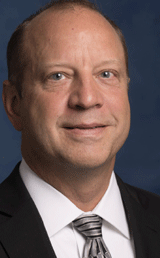 Mark
Albrecht is Managing Director, Cargo Logistics for United Airlines. His
responsibilities include oversight of United Cargo's costs, capital expenditures,
and claims as well as management of United's ULD assets, road feeder service,
and policy, procedure and safety. Albrecht joined United Airlines in 1984
and has held a number of management positions in Vendor Planning, Aircraft
Scheduling, Onboard Schedule Planning, and the Credit Union. Prior to
his current position, Albrecht was United's Director of Cargo Operations
Excellence. Mark
Albrecht is Managing Director, Cargo Logistics for United Airlines. His
responsibilities include oversight of United Cargo's costs, capital expenditures,
and claims as well as management of United's ULD assets, road feeder service,
and policy, procedure and safety. Albrecht joined United Airlines in 1984
and has held a number of management positions in Vendor Planning, Aircraft
Scheduling, Onboard Schedule Planning, and the Credit Union. Prior to
his current position, Albrecht was United's Director of Cargo Operations
Excellence.
FT: We
are fascinated by success in areas where others see no space for satisfaction.
Traditionally your area of business has been controversial in many airlines’
business and some of them have decided, or are tempted to outsource these
altogether. This notwithstanding United seem to consider this area as
integral with its cargo operations and their figures are on your side.
Can you name three essential factors that are significant in your success
story?
MA: Relentless
Focus on Continuous Improvement: One of the key factors contributing to
our success is our unwavering commitment to continuous improvement. We
continuously strive to enhance our processes, optimize efficiencies, and
innovate in order to stay ahead of the curve and meet evolving customer
demands.
Understanding the Delicate Balance of Cost
and Quality: We recognize the importance of striking the right balance
between cost and quality in our operations. By understanding the intricacies
of this delicate balance, we are able to deliver value to our customers
while maintaining competitive pricing and ensuring the highest standards
of service and reliability.
Team Culture of Thinking Like Entrepreneurs:
Our success is also attributed to the entrepreneurial mindset ingrained
within our team culture. Every member of our team is empowered to think
creatively, take ownership of their work, and proactively seek out opportunities
for growth and innovation. This entrepreneurial spirit fosters a dynamic
and agile work environment, enabling us to adapt quickly to changing market
conditions and drive sustainable business success.
 At
this point we would like to conclude this wide picture of the UNITED team
with its undisputed leader, Jan Krems, who was happy to take our questions: At
this point we would like to conclude this wide picture of the UNITED team
with its undisputed leader, Jan Krems, who was happy to take our questions:
FT: So
United is one of the 4 large U.S American airlines. Do you see this as
an opportunity for U.S. aviation or a challenge because none of them are
dominant in the position?
JK: I
see being one of the four major U.S. airlines as a significant opportunity
rather than a challenge. The aviation landscape in the U.S. is highly
competitive, with a few airlines nearly as large as us. This dynamic keeps
us on our toes, driving continuous improvement and innovation in our services.
Rather than striving to be the dominant force, we focus on delivering
the best possible experience for our customers. It's essential to avoid
complacency and remain dedicated to enhancing our operations every day.
In terms of cargo, United Cargo stands out
as the leader. While other domestic carriers are formidable competitors
in the passenger market, when it comes to cargo, there's no question that
we are the best. We are committed to maintaining this position by staying
ahead in terms of innovation and sustainability, ensuring that we continue
to provide exceptional service to our customers.
FT: Which
area of business in United do you expect to experience the largest area
of growth in the next couple of years?
JK: In
the next couple of years, we anticipate the largest area of growth for
United Cargo to be in ecommerce and specialty products. Ecommerce is rapidly
expanding, and we are capitalizing on this by investing in initiatives
such as APIs, Direct Connect, entering marketplaces, and enhancing our
online booking capabilities. Additionally, our focus on specialty products
is important. Ensuring top-notch quality is crucial in this area, as it
directly correlates with our ability to provide added value to our customers.
By prioritizing specialty and ecommerce segments, we are positioning ourselves
to seize the most significant growth opportunities and deliver exceptional
service to meet the evolving needs of our clients.
FT: What
are your key takeaways from the Worldwide Sales and Cargo Conference?
JK: From
the Worldwide Sales and Cargo Conference, my main takeaways boil down
to the importance of face-to-face time. There's just something special
about being in the same room, celebrating successes together, and sharing
our game plan for the year ahead. Plus, it's not just about talking business
– mixing it up with folks from different units, like passenger and
cargo, adds a whole new dimension. We get
to swap stories, learn from each other, and have some fun. So those are
the big takeaways for me: face time, teamwork, sharing ideas, and of course,
having a blast while we're at it.
These words conclude our special number
on Team United, Chicago and CNS. If it is true that every picture tells
a story, one can also say that every story gives a picture. This one is
the image showing this perfectly organized team, intent on finding the
best solutions for its company, first and foremost the best for its customers
and society at large. It is a meaningful impression, coming from the windy
city.
As we all have perfectly understood in many
years, far from being an attitude prone to boasting, the atmosphere of
Chicago surrounds solid, meaningful accomplishments that last for many
years.
GDA/Marco Sorgetti
|




